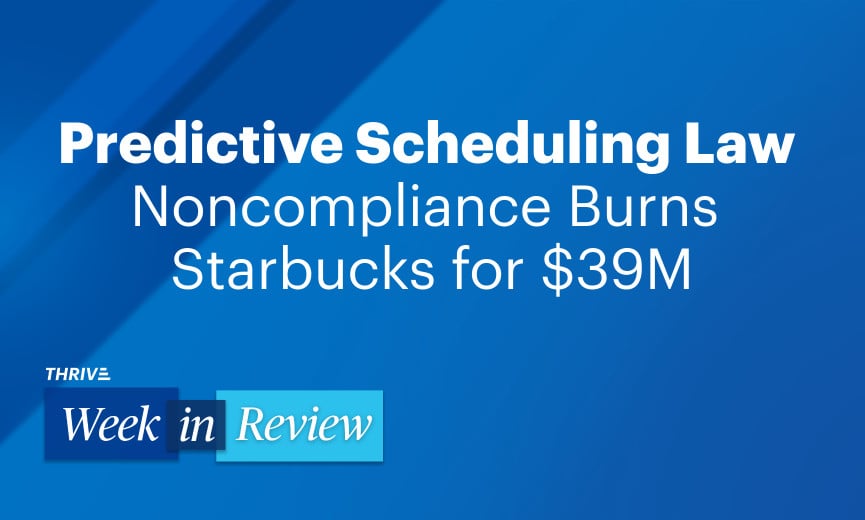- Thrive
-
Season
4Episode119
U.S. DOL Final Rule on Worker Classification Will Have Major Impact on Businesses

Podcast •

Summary
There are more than 65 million independent contractors in the United States, and if one of them works for you, then your business has to apply six factors listed by the new U.S. DOL Final Rule on Employee or Independent Contractor Classification to determine how to classify them. Gene Marks explains the six factors and notes that although the effective date is March 11, 2024, the rule could face challenges in court. Listen to the Paychex THRIVE Week in Review podcast for more details.
Additional resources: U.S. DOL’s Final Rule on Independent Contractors
View Transcript
[Gene Marks, host]
Hey, everybody, it's Gene Marks, and welcome to this week's episode of the Paychex THRIVE Week in Review. Now, normally, as you know, we take like three items in the news that impact your business and we kind of talk a little bit about why it impacts your business and some thoughts on that. But this week I'm going to do a little something different. We're going to talk about just one item because there was a big piece of news that came out last week that really has a big impact on your business.
Back on Jan. 10 last week, the Department of Labor finalized their rules regarding worker classifications or classifying whether or not you should treat an independent contractor as an employee or not. And it's really, really big news because it impacts so many businesses. So, let me tell you what you need to know about this rule.
First of all, if you really want to dig into the details, the Department of Labor issued something called a Small Entity Compliance Guide. So, look for it. It's kind of a long URL, so I'm not going to give that here, but I will tell you this much; if you just Google Department of Labor Small Entity Compliance Guide, you will find it where really lays out the details of this rule and also gives you some examples, okay.
Now, going forward, if you are going to determine whether somebody or not is an independent contractor or an employee – by an independent contractor, I mean, it's somebody like a freelancer who's working independently for your business, you just pay them by check, you don't have to pay any taxes on them, you don't have to provide them benefits or any worker protections or anything like that. They're on their own. You know, you give them a 1099 form at the end of the year if you pay them more than $600, if they're an independent contractor like that, well, their classification might change.
You might need to be reclassifying them and including them as an individual, as an employee. If they are, they're going to be subject to six tests. Now, these six tests aren't necessarily all of them have to comply; it could be a combination of a few. But here are the six things that you need to consider.
Number one, whether or not that worker can negotiate the charge oo the pay for the work provided in other words, that they have the opportunity for product or loss. You don't set the fee. The workers should be able to determine what their prices are and negotiate that with you. Okay.
Number two, whether or not that worker is fully entrepreneurial. In other words, do they use their own tools and have their own workers working for them and have their own, you know, capital requirements to be fully independent and at arm's length? So, whether or not they're fully entrepreneurial in nature will also factor into this determination.
The third factor is the degree of permanence. In other words, is this a fixed relationship? Is it seasonal? Is it temporary? Is it short term? Obviously, if it's very long term, then it could, you know, kind of smell like it's an employee-employer relationship. So, it really has to determine if it's on a sort of a project by project or a customer-by-customer basis.
Factor four, whether or not you exercise control over that worker. Are you setting that person's schedule? Are you supervising their performance? Are you putting limits on the work that they do or the technology they use? The level of control that you enforce over that worker could also have an impact over whether or not that person is an independent contractor or an employee.
The fifth factor I'm going to skip over and get back to it and then we'll get back to the six factor, which is basically the skills or initiatives that the worker has. In other words, is the worker dependent on training that you're providing or whether the worker's bringing specialized skills to a work relationship. If they're used in connection with the business has an impact on whether or not they're independent or if they're an employee.
So, to give an example, say it's a highly skilled welder and they're working for you, right? If that even if they're skilled, you're telling them what to do when you exercise control over them, that really kind of leads to the fact that they're more of an employee. So, that's the that's the fifth factor.
The last factor, I think, is the most important one. It's the newest one, as well. It's whether or not that worker is integral to your business and that means whether or not that individual is helping you to generate revenue for your business or is core to your business operation.
So, say you run, I don't know, an accounting firm like me. If I have an independent contractor that is doing accounting services for my clients and I bill that person's work out to my clients, well then, that person is generating revenue to me. That person is performing a core work for my firm. Now, if I have that same independent worker is providing marketing services for me, which I'm using to get new clients, well, that's not core, that's not integral. So, that person could potentially be or continue to be an independent contractor.
So, again, let me summarize up what these six factors are again.
- No. 1, whether or not they have the ability to negotiate their own prices with you. Okay.
- No. 2, whether or not they're fully entrepreneurial, they can use their own tools and have their own sort of business going on.
- No. 3, whether or not it's a long-term or a short-term relationship.
- No. 4, whether or not you exercise undue control over that worker, telling them what their schedule is and the performance of the work and how they should be doing their work.
- No. 5 is whether or not that person has the own their own ability to have their own skills and initiatives to do their work. You don't set what their skills are or what professional certifications they have.
- And No. 6, to me the most important one, is whether or not that worker is integral to your business. In other words, generating revenue for your business or you're performing core operations that are part of your business.
Now, here's the thing about this independent contractor rule. It goes into effect in March of 2014. Most attorneys are advising their clients to sort of wait and see because right now there are some lawsuits that are out there that were contesting an older entrepreneurial independent contractor rule, which are now going to come live again. In addition to that, some of the larger business organizations like the National Federation of Independent Businesses and the U.S. Chamber of Commerce, as well as other groups, may also sue the Department of Labor. All of this could suspend this rule.
Then also bear in mind that depending on the outcome of the November 2024 elections, if President Biden gets re-elected, this will continue on and the government will fight to make it real. If President Biden loses the election, then it's quite possible that a successor president may not continue on with this rule and revert back to something that's a little bit less complicated.
So, 2024 is sort of like a limbo year to figure out what to do about all of this. However, as a business owner, you should still prepare. You need to look at all of your independent contractors and you need to determine whether or not they would fall under any of these six factors. You should talk to a labor attorney or to your payroll service firm and get some advice as to whether or not you're classifying them correctly, and if you think there is any misclassification, either reclassify them as an employee or set aside some reserves in case they do become an employee.
Remember, if you have to classify an independent contractor now as an employee going forward, you're going to be responsible for employer taxes and benefits and insurance like workers’ compensation, as well as they'll have worker's rights and the ability to unionize. All of those factors will come into play.
Now, this is not limited to any size of business. This can be any businesses that are applicable to this rule and it is definitely something that will be out there and will have a big impact. Businesses that are in the trucking industry, programming and software development, financial services, as well as homecare and healthcare services. I think those are the ones that are going to be most exposed to these types of factors that that may have to be reclassifying a lot of their independent contractors as employees. So, we will wait and see.
So, that's what we know so far about this new worker classification rule from the Department of Labor. Surely there will be lots more information coming from Paychex about this rule and I'm sure we’ll be covering, you know, aspects of it in future episodes of Paychex THRIVE’s podcast.
My name is Gene Marks, and you've been listening to this week's Week in Review, what you need to know about the new worker classification ruling. If any help or advice you would like to suggest. To get a guest for our THRIVE podcast, please visit us at payx.me/thrive topics. Thanks for listening. We'll be back again next week with another episode of Week in Review. We'll talk about some other news that impacts your small business and what to do about that. Take care.
This podcast is property of Paychex, Inc. 2024. All rights reserved.

 Apple Podcast
Apple Podcast Spotify
Spotify iHeartRadio
iHeartRadio








